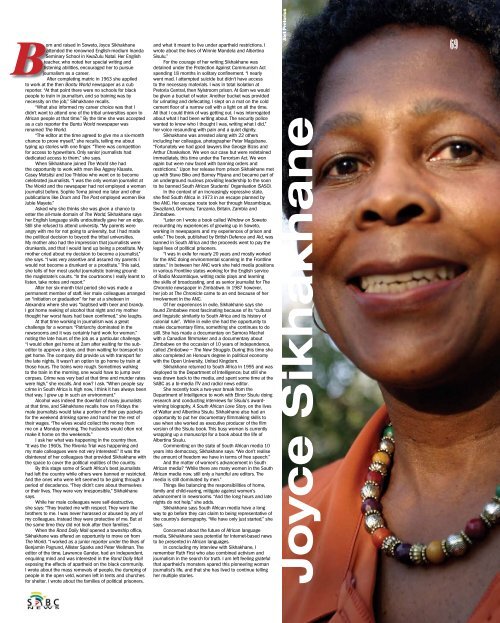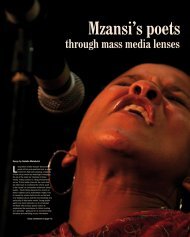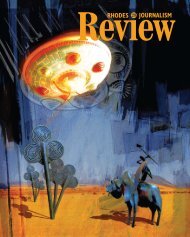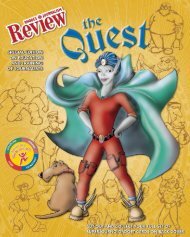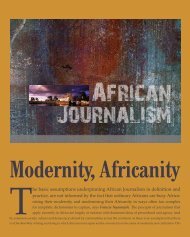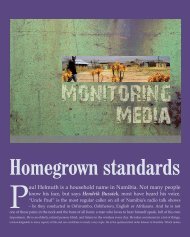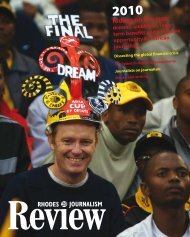FULL PDF - Rhodes Journalism Review - Rhodes University
FULL PDF - Rhodes Journalism Review - Rhodes University
FULL PDF - Rhodes Journalism Review - Rhodes University
Create successful ePaper yourself
Turn your PDF publications into a flip-book with our unique Google optimized e-Paper software.
orn and raised in Soweto, Joyce Sikhakhane<br />
attended the renowned English-medium Inanda<br />
Seminary School in KwaZulu Natal. Her English<br />
teacher, who noted her special writing and<br />
listening abilities, encouraged her to pursue<br />
journalism as a career.<br />
After completing matric in 1963 she applied<br />
to work at the then Bantu World newspaper as a cub<br />
reporter. “At that point there were no schools for black<br />
people to train in journalism, and so training was by<br />
necessity on the job,” Sikhakhane recalls.<br />
“What also informed my career choice was that I<br />
didn’t want to attend one of the tribal universities open to<br />
African people at that time.” By the time she was accepted<br />
as a cub reporter the Bantu World newspaper was<br />
renamed The World.<br />
“The editor at the time agreed to give me a six-month<br />
chance to prove myself,” she recalls, telling me about<br />
typing up stories with one finger. “There was competition<br />
for access to typewriters. Only senior journalists had<br />
dedicated access to them,” she says.<br />
When Sikhakhane joined The World she had<br />
the opportunity to work with men like Aggrey Klaaste,<br />
Casey Motsitsi and Joe Thloloe who went on to become<br />
celebrated journalists. “I was the only woman journalist at<br />
The World and the newspaper had not employed a woman<br />
journalist before. Sophie Tema joined me later and other<br />
publications like Drum and The Post employed women like<br />
Jubie Mayete.”<br />
Asked why she thinks she was given a chance to<br />
enter the all-male domain of The World, Sikhakhane says<br />
her English language skills undoubtedly gave her an edge.<br />
Still she refused to attend university. “My parents were<br />
angry with me for not going to university, but I had made<br />
the political decision to boycott the tribal universities.<br />
My mother also had the impression that journalists were<br />
drunkards, and that I would land up being a prostitute. My<br />
mother cried about my decision to become a journalist,”<br />
she says. “I was very assertive and assured my parents I<br />
would not become a drunkard or a prostitute.” This said,<br />
she tells of her most useful journalistic training ground:<br />
the magistrate’s courts. “In the courtrooms I really learnt to<br />
listen, take notes and report.”<br />
After her six-month trial period she was made a<br />
permanent member of staff. Her male colleagues arranged<br />
an “initiation or graduation” for her at a shebeen in<br />
Alexandra where she was “baptised with beer and brandy.<br />
I got home reeking of alcohol that night and my mother<br />
thought her worst fears had been confirmed,” she laughs.<br />
At that time working in journalism was a great<br />
challenge for a woman: “Patriarchy dominated in the<br />
newsrooms and it was certainly hard work for women,”<br />
noting the late hours of the job as a particular challenge.<br />
“I would often get home at 2am after waiting for the subeditor<br />
to approve a story, and then waiting for transport to<br />
get home. The company did provide us with transport for<br />
the late nights. It wasn’t an option to go home by train at<br />
those hours. The trains were rough. Sometimes walking<br />
to the train in the morning, one would have to jump over<br />
corpses. Crime was very bad at that time and murder rates<br />
were high,” she recalls. And now? I ask. “When people say<br />
crime in South Africa is high now, I think it has always been<br />
that way. I grew up in such an environment.”<br />
Alcohol was indeed the downfall of many journalists<br />
at that time, and Sikhakhane recalls how on Fridays the<br />
male journalists would take a portion of their pay packets<br />
for the weekend drinking spree and hand her the rest of<br />
their wages. “The wives would collect the money from<br />
me on a Monday morning. The husbands would often not<br />
make it home on the weekends.”<br />
I ask her what was happening in the country then.<br />
“It was the 1960s. The Rivonia Trial was happening and<br />
my male colleagues were not very interested.” It was the<br />
disinterest of her colleagues that provided Sikhakhane with<br />
the space to cover the political realities of the country.<br />
By this stage some of South Africa’s best journalists<br />
had left the country while others were banned or restricted.<br />
And the ones who were left seemed to be going through a<br />
period of decadence. “They didn’t care about themselves<br />
or their lives. They were very irresponsible,” Sikhakhane<br />
says.<br />
While her male colleagues were self-destructive,<br />
she says: “They treated me with respect. They were like<br />
brothers to me. I was never harassed or abused by any of<br />
my colleagues. Instead they were protective of me. But at<br />
the same time they did not look after their families.”<br />
When the Rand Daily Mail opened a township office,<br />
Sikhakhane was offered an opportunity to move on from<br />
The World. “I worked as a junior reporter under the likes of<br />
Benjamin Pogrund, Allister Sparks and Peter Wellman. The<br />
editor of the time, Lawrence Gander, had an independent,<br />
enquiring mind and was interested in the Rand Daily Mail<br />
exposing the effects of apartheid on the black community.<br />
I wrote about the mass removals of people, the dumping of<br />
people in the open veld, women left in tents and churches<br />
for shelter. I wrote about the families of political prisoners,<br />
and what it meant to live under apartheid restrictions. I<br />
wrote about the lives of Winnie Mandela and Albertina<br />
Sisulu.”<br />
For the courage of her writing Sikhakhane was<br />
detained under the Protection Against Communism Act<br />
spending 18 months in solitary confinement. “I nearly<br />
went mad. I attempted suicide but didn’t have access<br />
to the necessary materials. I was in total isolation at<br />
Pretoria Central, then Nylstroom prison. At 6am we would<br />
be given a bucket of water. Another bucket was provided<br />
for urinating and defecating. I slept on a mat on the cold<br />
cement floor of a narrow cell with a light on all the time.<br />
All that I could think of was getting out. I was interrogated<br />
about what I had been writing about. The security police<br />
wanted to know who I thought I was, writing what I did,”<br />
her voice resounding with pain and a quiet dignity.<br />
Sikhakhane was arrested along with 22 others<br />
including her colleague, photographer Peter Magubane.<br />
“Fortunately we had good lawyers like George Bizos and<br />
Arthur Chaskalson. We won our case but were redetained<br />
immediately, this time under the Terrorism Act. We won<br />
again but were now faced with banning orders and<br />
restrictions.” Upon her release from prison Sikhakhane met<br />
up with Steve Biko and Barney Pityana and became part of<br />
an underground nucleus providing leadership to the soon<br />
to be banned South African Students’ Organisation (SASO).<br />
In the context of an increasingly repressive state,<br />
she fled South Africa in 1973 in an escape planned by<br />
the ANC. Her escape route took her through Mozambique,<br />
Swaziland, Germany, Tanzania, Britain, Zambia and<br />
Zimbabwe.<br />
“Later on I wrote a book called Window on Soweto<br />
recounting my experiences of growing up in Soweto,<br />
working in newspapers and my experiences of prison and<br />
exile.” The book, published by British Defence and Aid, was<br />
banned in South Africa and the proceeds went to pay the<br />
legal fees of political prisoners.<br />
“I was in exile for nearly 20 years and mostly worked<br />
for the ANC doing environmental scanning in the Frontline<br />
states.” In between her ANC work she held media positions<br />
in various Frontline states working for the English service<br />
of Radio Mozambique, writing radio plays and learning<br />
the skills of broadcasting, and as senior journalist for The<br />
Chronicle newspaper in Zimbabwe. In 1987 however,<br />
her job at The Chronicle came to an end because of her<br />
involvement in the ANC.<br />
Of her experiences in exile, Sikhakhane says she<br />
found Zimbabwe most fascinating because of its “cultural<br />
and linguistic similarity to South Africa and its history of<br />
colonial rule”. While in exile she had the opportunity to<br />
make documentary films, something she continues to do<br />
still. She has made a documentary on Samora Machel<br />
with a Canadian filmmaker and a documentary about<br />
Zimbabwe on the occasion of 10 years of independence,<br />
called Zimbabwe – The New Struggle. During this time she<br />
also completed an Honours degree in political economy<br />
with the Open <strong>University</strong>, United Kingdom.<br />
Sikhakhane returned to South Africa in 1995 and was<br />
deployed to the Department of Intelligence; but still she<br />
was drawn back to the media, and spent some time at the<br />
SABC as a bi-media (TV and radio) news editor.<br />
She recently took a two-year break from the<br />
Department of Intelligence to work with Elinor Sisulu doing<br />
research and conducting interviews for Sisulu’s awardwinning<br />
biography, A South African Love Story, on the lives<br />
of Walter and Albertina Sisulu. Sikhakhane also had an<br />
opportunity to put her documentary filmmaking skills to<br />
use when she worked as executive producer of the film<br />
version of the Sisulu book. This busy woman is currently<br />
wrapping up a manuscript for a book about the life of<br />
Albertina Sisulu.<br />
Commenting on the state of South African media 10<br />
years into democracy, Sikhakhane says: “We don’t realise<br />
the amount of freedom we have in terms of free speech.”<br />
And the matter of women’s advancement in South<br />
African media? “While there are many women in the South<br />
African media now, still only a handful are editors. The<br />
media is still dominated by men.”<br />
Things like balancing the responsibilities of home,<br />
family and child-rearing, mitigate against women’s<br />
advancement in newsrooms. “And the long hours and late<br />
nights do not help,” she adds.<br />
Sikhakhane says South African media have a long<br />
way to go before they can claim to being representative of<br />
the country’s demography. “We have only just started,” she<br />
says.<br />
Concerned about the future of African language<br />
media, Sikhakhane sees potential for Internet-based news<br />
to be presented in African languages.<br />
In concluding my interview with Sikhakhane, I<br />
remember Ruth First who also combined activism and<br />
journalism in the search for truth. I am left feeling grateful<br />
that apartheid’s monsters spared this pioneering woman<br />
journalist’s life, and that she has lived to continue telling<br />
her multiple stories.<br />
Alet Pretorius<br />
Joyce Sikhakhane


